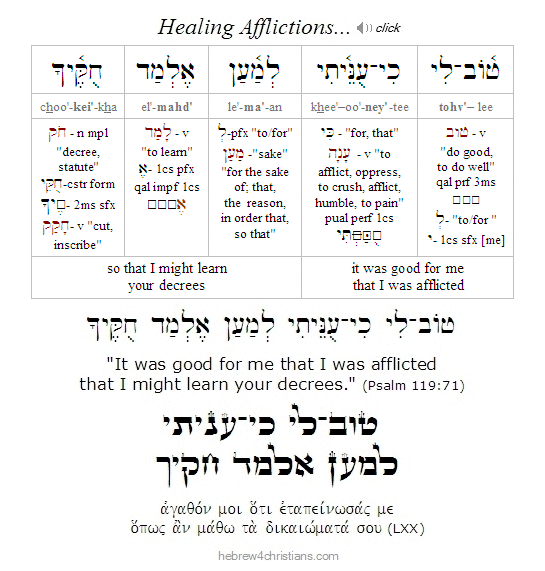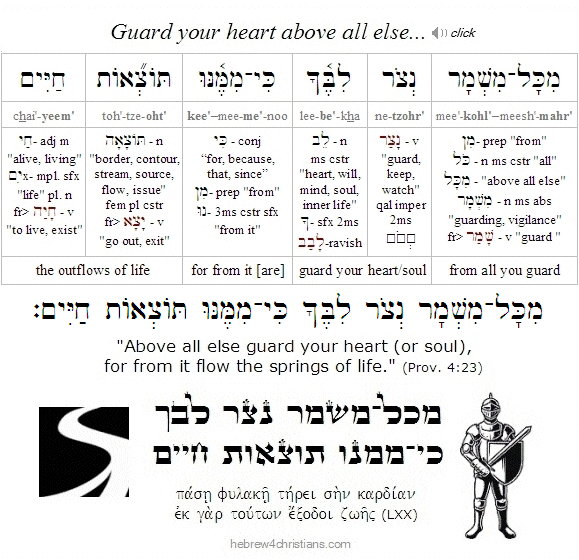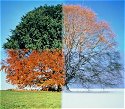|
How hurriedly the days go by; how quickly the seasons change! It seems that we've just begun the task of teshuvah and now Rosh Hashanah is upon us... Perhaps that's part of the reason why Jewish tradition sets aside an entire month to help us get ready. We need the month of Elul to help us slow down and reconnect with what matters most of all -- our relationship with God, others, and ourselves.
But perhaps we've wasted time this month, squandering the opportunity to undergo cheshbon ha-nefesh (self-examination) and to take account of our lives before the LORD? It's never too late, really. The gates of repentance are always open. "Today, if you hear his voice, do not harden your heart" (Heb. 3:15).
Though it's a difficult and sometimes painful process, the primary goal of teshuvah is healing from the oppression of our sins and the restoration of our relationships. Someone once said that great sins are like great possessions -- both are difficult to give up. We have to be willing to "give up our sins" in order to find inner healing (and "giving up our sins" also may mean breaking free of the "pride-shame" cycle). Often we can only get to this point when we are afflicted and weary of our soul's sickness. We get "sick of our sickness..." Looked at this way, our afflictions are a really gift from the LORD to help us turn and surrender to Him. As the psalmist wrote: ūśūĢų╣ūæųŠū£ų┤ūÖ ūøų┤ūÖųŠūóų╗ūĀų╝ųĄūÖū¬ų┤ūÖ ū£ų░ū×ųĘūóųĘū¤ ūÉųČū£ų░ū×ųĘūō ūŚų╗ū¦ų╝ųČūÖūÜųĖ / "It was good for me that I was afflicted, that I might learn your statutes" (Psalm 119:71).
 |
It's important to remember that one of the main goals of the devil is to induce a sense of forgetfulness and apathy. The devil wants you to forget that you are ben melech (or bat melech) - a son (or daughter) of the King. The entire venture of teshuvah presupposes that you are created b'tzelem Elohim - in the image of God - and therefore you have infinite value and dignity. This is all the more evident in light of the awesome ransom that Yeshua our Lord paid in order to reconcile your soul with God. What is the greatest sin you can commit in your life? To forget what God has done for you... Remaining asleep, unmindful of your true identity is one of the most tragic things of life.... Therefore Rosh Hashanah is sometimes called Yom Ha-Zikaron - the "Day of Remembrance" (Lev. 23:24). The blast of the shofar is meant to jolt us from our sleep... We are to remember who we really are -- and to remember that God is our King. The person who says, "Tomorrow I will do teshuvah" really is saying, "Not now." And then tomorrow comes and he says, "Not now." And in this way his entire life passes by, saying, "Not now." Finally one day he wakes up only to find himself already dead...
According to some of the sages past events are not fixed in stone; rather they -- like our relationship to them -- can change. We do not have to live with childhood trauma or bitterness from the past. Teshuvah means "putting away childish things" and growing up (1 Cor. 13:11). Only our personal future is unknown and therefore seemingly "static." The forgiveness given through Yeshua redeems all of our sins -- including those that might haunt us from our past. Our present response to the LORD has the potential to transform everything in our lives -- both our past, present, and future... His love transforms every aspect of our lives, from cradle to grave. God is always present whenever we let Him in.
The sages point out that the gematria for the word Elul (ūÉū£ūĢų╝ū£) equals binah (ūæų╝ūÖūĀūö), suggesting that teshuvah is a matter of the heart's understanding of itself. Of course this is not to suggest that we should do teshuvah only during the 40 days before Yom Kippur. On the contrary, teshuvah is a lifelong and ongoing process -- a daily struggle to retain our focus and faith. Repentance is often "slow motion," involving lots of smaller decisions we make throughout the days of the year... This is the normal course of genuine transformation (or "sanctification"). The process of seeking the LORD is an ongoing process of discovery about God's love and forgiveness. For this reason the confession of sin should be a regular part of our fellowship with one another (James 5:16).
 |
The essence of Torah is to love your neighbor as yourself (Rom. 13:10; Gal. 5:14). Teshuvah means, among other things, understanding how far we are removed from this ideal and how we might move to remedy the breach. This is a daily task, an ongoing duty... But we cannot give away what we don't have to give, so if we're deficient in self-love, we will be unable to genuinely love others, too. Part of loving others is the obligation to forgive yourself for your sins. For some people, this might mean "accepting that they are accepted" by God... Real change is difficult -- some would even say impossible -- though with God all things are possible -- including the miracle of a heart of stone turning to flesh.
Forgiving others is a way to be free of their hold over us. It is a letting go of the pain of the past and finding courage to press on in hope. In the Gates of Repentance it is written: ŌĆÄ"I hereby forgive all who have hurt me, all who have wronged me, whether deliberately or inadvertently, whether by word or by deed. May no one be punished on my account. And as I forgive and pardon those who have wronged me, may those whom I have harmed forgive me, whether I acted deliberately or inadvertently, whether by word or by deed." Amen... It is only when we give up our hurt that we are able to move forward in the realm of the spirit. Faith and forgiveness are therefore intimately linked. Therefore Yeshua taught us to forgive others whenever we pray to the Father (Matt. 6:12).
For this coming year, may it please the LORD to first of all help us to love Him with all of our hearts, and to love others as we love ourselves... May it please Him that we "lay aside every weight, and sin which clings so closely, and run with endurance the race that is set before us" (Heb. 12:1). May the LORD renew our minds so that we might discern His will (Rom. 12:2), and may He help us abide in Him -- so that we will not be ashamed at His coming (1 John 2:28). May the new year be good and sweet for us all, and may our righteous deeds increase, like the many seeds of the pomegranate (1 John 2:29).
Hashivenu Adonai elecha ve'nashuvah, chadesh yamenu ke'kedem: "Turn thou us unto Thee, O LORD, and we shall be turned; Renew our days as of old" (Lam. 5:21).
 |
|





